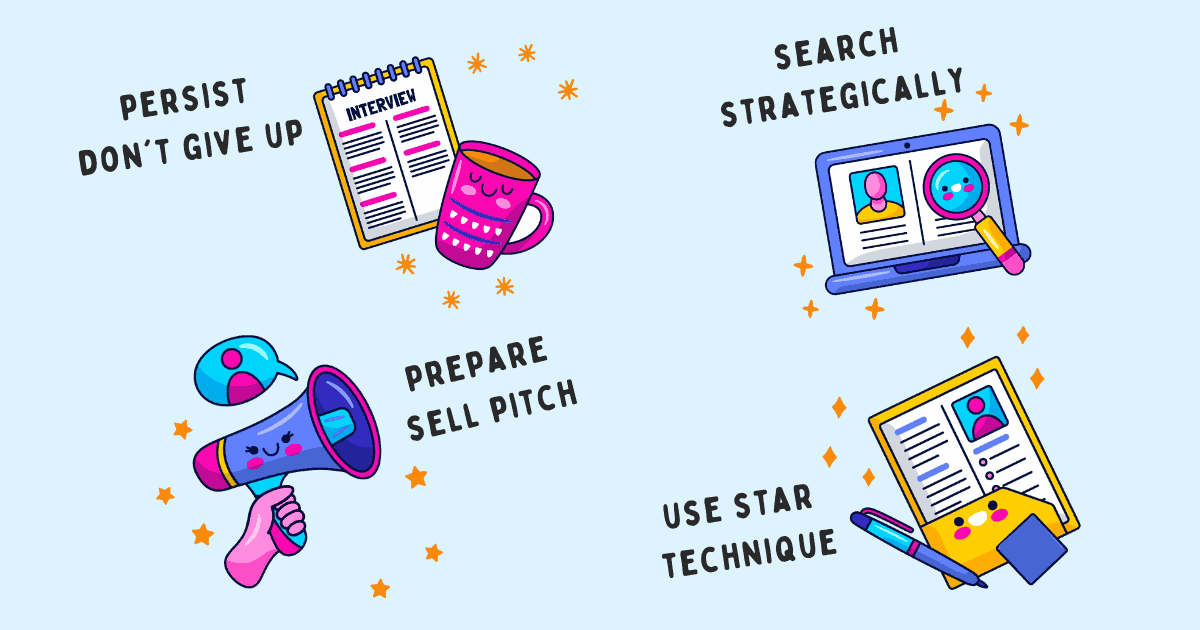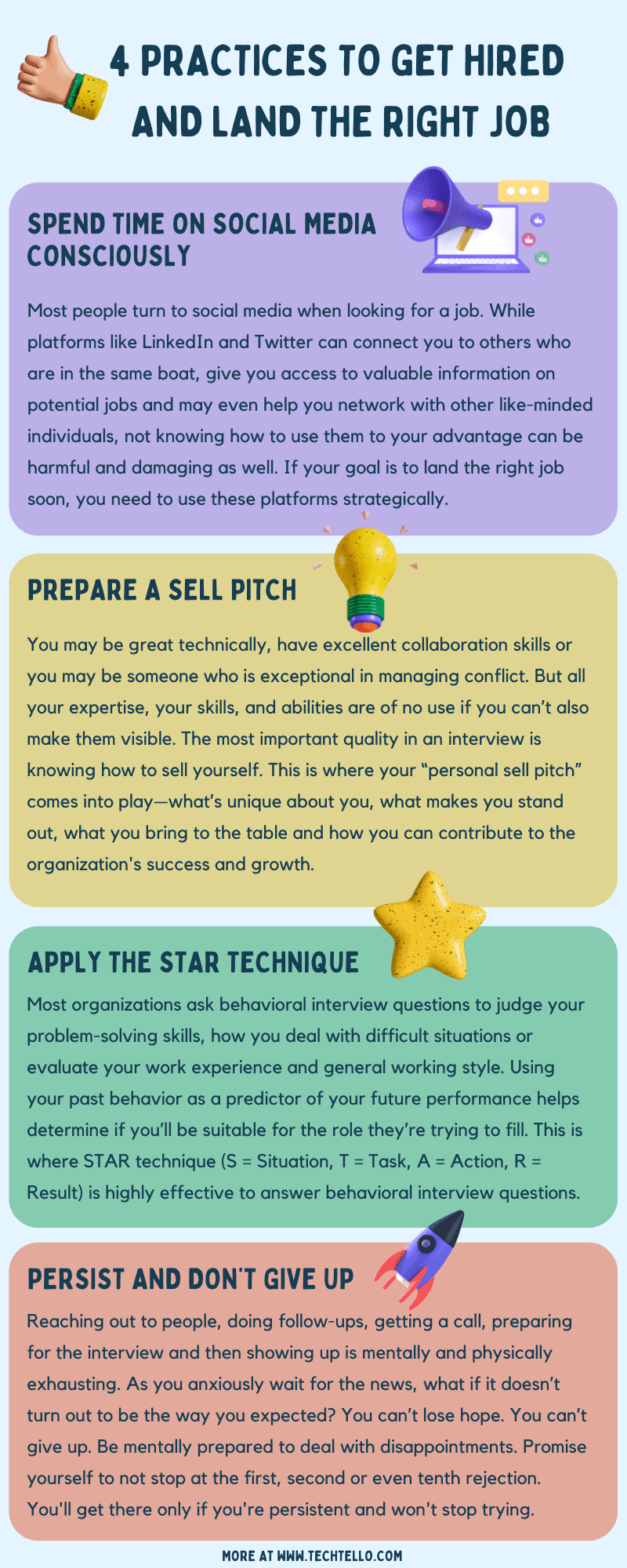Want to Get Hired? Here’s What You Need to Do to Land the Right Job

With the uncertainty in the economy, many companies have not only announced a hiring freeze but are also downsizing their entire divisions and non-profitable initiatives.
Elon Musk who took over as the CEO of Twitter recently slashed its workforce in half. The company laid off 45-50% of the total strength of 7500 employees globally saying it was necessary as the company was losing over $4 million dollars per day. Following Musk’s suit was Mark Zuckerberg who announced the largest scale layoffs in company history in an effort to cut costs. Recently 11000 people were laid off by Meta.
After Meta and Twitter, Microsoft, Amazon and other tech companies have fired thousands of employees amidst a rocky macroeconomic environment.
Whether you’re forced to find another job or someone who’s doing it as a choice, the process to find another job is never easy. Making mistakes by not following good practices reduces the likelihood of you landing a job on time, builds stress and may even hurt you mentally and financially.
If you want to get hired in a company of your choice, follow these practices.
The choices you make from this day forward will lead you, step by step, to the future you deserve
—Chris Murray, The Extremely Successful Salesman’s Club
4 practices to get hired and land the right job
1. Spend time on social media consciously
Most people turn to social media when looking for a job. While platforms like LinkedIn and Twitter can connect you to others who are in the same boat, give you access to valuable information on potential jobs and may even help you network with other like-minded individuals, not knowing how to use them to your advantage can be harmful and damaging as well.
When you’re not conscious about how you’re spending your time on social media, you may end up:
- Feeling overwhelmed with information overload. There’s just too much content. How do you separate signal from noise?
- Getting discouraged and scared by consuming content that highlights your fears. If so many people are getting fired and losing their jobs, what chance do you have?
- Wasting too much time scrolling and reading information or communicating with people who actually don’t add real value.
If your goal is to land the right job soon, you need to use these platforms strategically. I am not suggesting you stay out of touch with reality, but drowning in negative information or mindlessly spending time scrolling through feeds will do you no good. Instead, do this:
- Identify people in your network who are placed in positions or jobs you’re seeking. Leave them a personal note, ask if they have openings and request for introductions and connections to help you land the right job.
- Avoid people who are just sharing information without being helpful. They are there to gain followers and likes and don’t really care about your job. Instead, look for those who are genuinely involved in making a difference. They will always leave information on how to connect with them or use their network to give you access to job postings and other useful connections.
- Look up job postings on platforms like LinkedIn and connect with their HR to find out if there’s an opening.
- When you’re not sure about the future, your mind will automatically try to seek more negative information. Don’t feed its fears.
- Limit the time spent. Plan what you intend to do once you visit these sites, do just that and then log out.
Consciously planning what you’re letting into your life—by avoiding negativity and taking a more balanced perspective—will make you feel in control. A feeling of control will stop rumination by encouraging you to look forward and take constructive action. As Cal Newport says in Deep Work “What we choose to focus on and what we choose to ignore—plays in defining the quality of our life.”
2. Prepare a sell pitch
You may be great technically, have excellent collaboration skills or you may be someone who is exceptional in managing conflict. But all your expertise, your skills, and abilities are of no use if you can’t also make them visible.
The most important quality in an interview is knowing how to sell yourself. You can’t expect others to hire you just because you have been fired or got bored with your previous job. Saying “I am looking for better opportunities” is great. But it doesn’t talk about why they should hire you above so many other candidates.
If you don’t know why you’d hire you, neither will they
― Frank Sonnenberg, BookSmart
This is where your “personal sell pitch” comes into play—what’s unique about you, what makes you stand out, what you bring to the table and how you can contribute to the organization’s success and growth.
When answering the question that most employers tend to ask “why are you looking out for a job,” briefly talk about the fact that you’re fired or whatever is the reason for seeking a new job. Then shift gears and divert their attention to your strengths and skills. Only when they see the value you’ll bring to the organization and team, will they fight for you and try to get you on board.
3. Apply the star technique
Most organizations ask behavioral interview questions to judge your problem-solving skills, how you deal with difficult situations or evaluate your work experience and general working style.
It’s considered a highly effective technique to get to know you better. Using your past behavior as a predictor of your future performance helps determine if you’ll be suitable for the role they’re trying to fill. Your reactions and responses to various situations at work provide useful inputs into how you communicate, collaborate and work with others.
Here are some common behavioral interview questions:
- Tell me about a recent setback at work and how you handled it.
- Tell me about a recent project where you had to work under pressure. What challenges did you face and how did you overcome them?
- Tell me about a time when you made a mistake. What did you do afterward?
- Tell me about a time when you faced a conflict with a coworker. How did you handle it?
It’s hard to answer these questions if you aren’t prepared or don’t know how to structure your thoughts well. This is where STAR technique (S = Situation, T = Task, A = Action, R = Result) is highly effective to answer behavioral interview questions.
This is how it works:
- Situation: Present the situation based on the question being asked. Set the scene, share context and give the necessary details to describe what happened.
- Task: Describe what was your responsibility in that situation. The interviewer will be looking to see what you were trying to achieve from the situation.
- Action: What did you do? The interviewer will be looking for information on what you did, why you did it and what the alternatives were.
- Result: What was the outcome of your actions? What did you achieve through your actions? Did you meet your objectives? What did you learn from this experience? Have you used this learning since?
Make sure to pick a story—even when talking about your failures and mistakes—with a positive outcome either as learnings or steps you took to improve.
Star Interview Method Questions
Ace your job interviews using these 65 behavioral interview questions. Star method’s structured approach helps you stand out by providing compelling, concise and useful answers.
4. Persist and don’t give up
Reaching out to people, doing follow-ups, getting a call, preparing for the interview and then showing up is mentally and physically exhausting. As you anxiously wait for the news, what if it doesn’t turn out to be the way you expected? Rejections, no response or long wait cycles are quite common during the interview process.
You can’t lose hope. You can’t give up.
Be mentally prepared to deal with disappointments. Promise yourself to not stop at the first, second or even tenth rejection. You’ll get there only if you’re persistent and won’t stop trying or as Anna Lembke says in Dopamine Nation “We must be willing to move forward despite being uncertain of what lies ahead. We must have faith that actions today that seem to have no impact in the present moment are in fact accumulating in a positive direction, which will be revealed to us only at some unknown time in the future. Healthy practices happen day by day.”
Here are key things to remind yourself when dealing with rejection:
- Rejection is not a measure of your worth.
- You can find a job only if you keep trying, not by succumbing to negative thoughts and doing nothing.
- Everything that seems so hard at the moment or the difficulties you have to face is only temporary.
- All your effort will pay off once you land the right job.
We all want to get the job of our dreams and stay in them forever. But the world is not fair and most things do not end up the way we expected. Instead of wasting time ruminating about the past, follow these practices to get hired in a job of your choice and create the future you deserve—be strategic about social media, prepare your sell pitch, use the STAR technique and don’t give up.
Some employers out there do want you. Yes, you. But it’s not their job to find you. It’s your job to find them. ― Richard N Bolles
Summary
- Finding the right job is a tiring process. When you don’t follow the right practices, your chances of finding the right job not only decrease, the stress and anxiety of an unknown future hurt your personal well-being and mental health too.
- While social media platforms like Twitter and LinkedIn can be helpful in finding the job you desire, not being strategic about how to use them can lead to mindless scrolling, strong negative emotions and may even confirm your irrational fears.
- Your skills and abilities matter. But what’s also useful is being able to highlight your strengths. You can’t stand out in the interview process unless the interviewer understands your unique value.
- Behavioral interview questions are used by most organizations to evaluate how candidates will perform in the future based on their past performance. Use the STAR technique to prepare your response to some of the most common questions.
- Prepare yourself for the worst and not the best-case scenario. It’s ok to be disappointed when the outcome of the interview is not in your favor, but don’t let that disappointment turn into a defeat. Keep trying and only look forward.


































